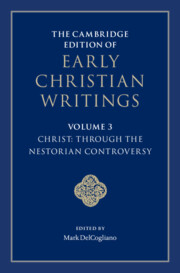Book contents
- The Cambridge Edition of Early Christian Writings
- The Cambridge Edition of Early Christian Writings
- The Cambridge Edition of Early Christian Writings
- Copyright page
- Contents
- Notes on Contributors
- Acknowledgments
- Note on the Texts and Translations
- Abbreviations
- Series Introduction
- Introduction
- Part I The Beginnings of Christology
- 1 Ascension of Isaiah 6–11 (Ethiopic Version)
- 2 The Gospel of Peter
- 3 The Epistle of the Apostles
- 4 The First Letter of Clement (Selections)
- 5 Ignatius of Antioch, Letters (Selections)
- 6 Epistle to Diognetus 1 and 7–12
- 7 Justin Martyr, First Apology 23, 30–32, 46, 63 and Second Apology 10, 13
- 8 Tatian, Address to the Greeks 4–7
- 9 Odes of Solomon 7, 19, 41, and 42
- 10 Treatise on Resurrection
- 11 A Ptolemaic Theology as Recounted by Irenaeus of Lyons in Against Heresies 1.8.5
- 12 Irenaeus of Lyons, Against Heresies (Selections)
- Part II Developing Christological Traditions
- Part III Traditions of Pro-Nicene Christology
- Part IV Controversy over Nestorius
- Suggestions for Further Reading
- Scriptural Index
4 - The First Letter of Clement (Selections)
from Part I - The Beginnings of Christology
Published online by Cambridge University Press: 05 February 2022
- The Cambridge Edition of Early Christian Writings
- The Cambridge Edition of Early Christian Writings
- The Cambridge Edition of Early Christian Writings
- Copyright page
- Contents
- Notes on Contributors
- Acknowledgments
- Note on the Texts and Translations
- Abbreviations
- Series Introduction
- Introduction
- Part I The Beginnings of Christology
- 1 Ascension of Isaiah 6–11 (Ethiopic Version)
- 2 The Gospel of Peter
- 3 The Epistle of the Apostles
- 4 The First Letter of Clement (Selections)
- 5 Ignatius of Antioch, Letters (Selections)
- 6 Epistle to Diognetus 1 and 7–12
- 7 Justin Martyr, First Apology 23, 30–32, 46, 63 and Second Apology 10, 13
- 8 Tatian, Address to the Greeks 4–7
- 9 Odes of Solomon 7, 19, 41, and 42
- 10 Treatise on Resurrection
- 11 A Ptolemaic Theology as Recounted by Irenaeus of Lyons in Against Heresies 1.8.5
- 12 Irenaeus of Lyons, Against Heresies (Selections)
- Part II Developing Christological Traditions
- Part III Traditions of Pro-Nicene Christology
- Part IV Controversy over Nestorius
- Suggestions for Further Reading
- Scriptural Index
Summary
The First Letter of Clement is an epistle addressed by the church in Rome to its counterpart in Corinth in response to an outbreak of factionalism there. In ancient sources it is ascribed to Clement, a leading figure of the church in Rome toward the end of the first century, but this attribution is now doubted. A late first-century date seems likely nonetheless, with most scholars placing the letter between 80 and 100 CE, and some more precisely in the mid-90s. The First Letter of Clement is thus one of the earliest extant Christian writings, as old as some of the documents that were later incorporated into the New Testament. It was greatly esteemed and extensively read in early Christianity; as late as the fourth century it was even regarded by some as part of the New Testament canon. Since the seventeenth century it has been included in the collection of early Christian writings known as the Apostolic Fathers.
- Type
- Chapter
- Information
- The Cambridge Edition of Early Christian Writings , pp. 44 - 52Publisher: Cambridge University PressPrint publication year: 2022

